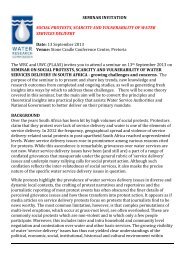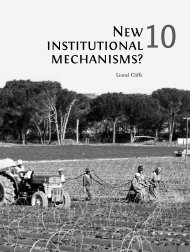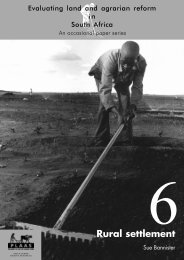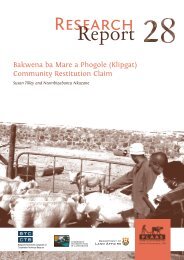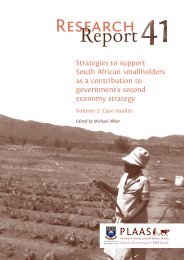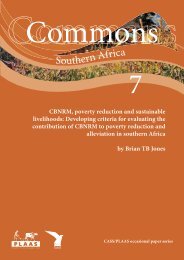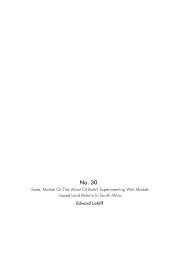A critical appraisal of South Africa's market-based land reform policy
A critical appraisal of South Africa's market-based land reform policy
A critical appraisal of South Africa's market-based land reform policy
You also want an ePaper? Increase the reach of your titles
YUMPU automatically turns print PDFs into web optimized ePapers that Google loves.
Chapter 2: International <strong>land</strong> <strong>reform</strong> debates<br />
Redistributive <strong>land</strong> <strong>reform</strong> will be<br />
largely <strong>based</strong> on willing-buyer willingseller<br />
arrangements. Government will<br />
assist in the purchase <strong>of</strong> <strong>land</strong> but will<br />
in general not be the buyer or owner.<br />
Rather it will make <strong>land</strong> acquisition<br />
grants available (DLA 1997:38).<br />
The White Paper suggests co-operation<br />
with the private sector and NGOs, interdepartmental<br />
co-ordination, capacity<br />
building at community level, and regular<br />
monitoring and evaluation (DLA 1997:95)<br />
The first redistribution programme was<br />
structured around the Settlement/Land<br />
Acquisition Grant provided by the government<br />
to assist families with an income <strong>of</strong><br />
less than R1 500 8 per month with <strong>land</strong><br />
purchases. The poor were clearly the target<br />
group and poverty alleviation was a main<br />
objective. Further innovations allowed for<br />
communal or group ownership and municipal<br />
commonage under the ownership and<br />
control <strong>of</strong> local government (DLA 1997).<br />
A review <strong>of</strong> the SLAG <strong>policy</strong> conducted<br />
by DLA from 1998 to 1999 identified a<br />
range <strong>of</strong> weaknesses in implementation<br />
and with the quality <strong>of</strong> the group projects<br />
created. A new Minister for Agriculture<br />
and Land Affairs was appointed in June<br />
1999 and she immediately called for<br />
changes to the redistribution policies and<br />
placed a moratorium on new SLAG<br />
projects (Lahiff 2001:4). In February 2000<br />
the Minister released a <strong>policy</strong> statement<br />
confirming weaknesses <strong>of</strong> the SLAG<br />
approach including the failure to realise<br />
<strong>land</strong> <strong>reform</strong> objectives, the reliance on<br />
<strong>market</strong> forces for redistribution failing to<br />
produce the desired results, and the SLAG<br />
grants being unsuitable for the creation <strong>of</strong><br />
a group <strong>of</strong> black commercial farmers<br />
(DLA 2000b:2). The <strong>policy</strong> statement<br />
outlined the new approach to redistribution<br />
and was followed shortly thereafter with<br />
the release <strong>of</strong> the first draft 9 <strong>of</strong> the Land<br />
Redistribution for Agricultural Development<br />
programme, which was to become the<br />
primary mechanism for <strong>land</strong> redistribution.<br />
DLA immediately started dealing with<br />
redistribution in terms <strong>of</strong> LRAD, although<br />
the <strong>policy</strong> was only finalised in April 2001<br />
and <strong>of</strong>ficially launched in August 2001<br />
with the handover <strong>of</strong> title deeds at<br />
Nkomazi in Mpumalanga (DLA 2002:<br />
55–9).<br />
LRAD is a more explicitly <strong>market</strong>friendly<br />
approach, closer in design to the<br />
suggestions <strong>of</strong> the World Bank (which was<br />
closely involved in its drafting) and other<br />
proponents <strong>of</strong> <strong>market</strong>-<strong>based</strong> <strong>land</strong> <strong>reform</strong>s<br />
than the SLAG programme had been<br />
(Lahiff 2001:5). This follows a broader<br />
shift in the post-liberation government’s<br />
economic policies that took on a more<br />
<strong>market</strong>- and investor-friendly direction<br />
with the adoption <strong>of</strong> Gear, the Growth<br />
Employment and Redistribution macroeconomic<br />
<strong>policy</strong>, in 1996.<br />
The LRAD programme has replaced an<br />
income ceiling under SLAG with an entry<br />
floor, requiring all beneficiaries to make<br />
their own contribution to projects (see<br />
Chapter 5 for details). It also puts more<br />
emphasis on ensuring an economic benefit<br />
from <strong>land</strong> redistribution and the promotion<br />
<strong>of</strong> a black commercial farming sector<br />
(Lahiff 2001:4–5). At the same time<br />
LRAD, like SLAG, has stated objectives <strong>of</strong><br />
improving the nutrition status and incomes<br />
<strong>of</strong> the poor and addressing the legacy <strong>of</strong><br />
inequitable <strong>land</strong>holding in <strong>South</strong> Africa<br />
(DLA 2001).<br />
Alongside the <strong>land</strong> <strong>reform</strong> programme<br />
there has been a dramatic liberalisation <strong>of</strong><br />
the agricultural sector more broadly. This<br />
has been in line with <strong>market</strong>-<strong>based</strong><br />
prescriptions <strong>of</strong> smaller state involvement,<br />
less regulation, the encouragement <strong>of</strong> ‘free<br />
trade’, and the removal <strong>of</strong> the ‘distortions’<br />
that had been a central part <strong>of</strong> the <strong>South</strong><br />
African agricultural economy for decades<br />
(Binswanger & Deininger 1996:92–3;<br />
Williams 1996:148; World Bank 2003:<br />
151). During the 1980s the govern-ment<br />
provided more than R4 billion in direct<br />
financial assistance and subsidies to about<br />
27 000 white farmers (Kirsten & Van Zyl<br />
1996:231). Government subsidies <strong>of</strong> wheat<br />
and maize alone amounted to over R500<br />
million in 1988. In addition to direct<br />
financial subsidisation, the government<br />
maintained a high level <strong>of</strong> tariff protection<br />
11




